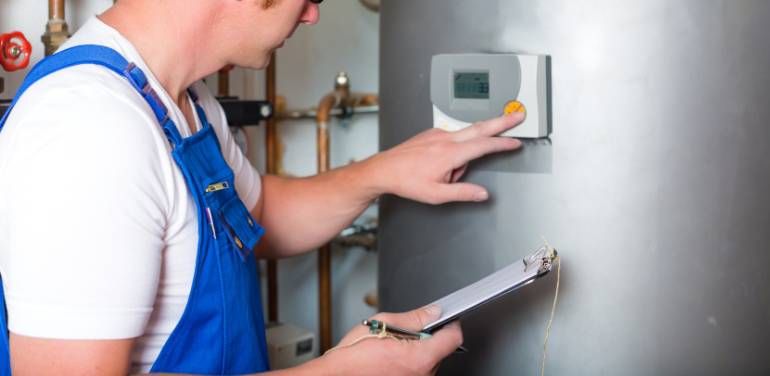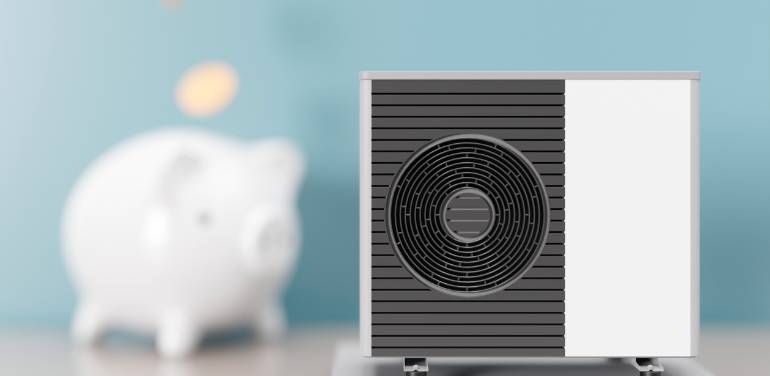Maintain and Gain: A Heating Maintenance Checklist to Add Years to Your System
The average cost of repairing a furnace is around $284 per repair. Seems relatively low, right? But that number can go up if you don’t take care of the system.
Routine heating maintenance is the easiest way to keep your system running and your repair costs low. But where do you even start?
Do you have to call a professional for everything? Are there tasks you can handle on your own?
Well, it depends. But as long as you know which maintenance tasks need to be taken care of, you’ll set yourself up for a far more comfortable winter year after year.
In this guide, we’ll cover some of the simplest and most essential maintenance tasks that will keep your system running smoothly for many years to come.
Clean the Outdoor Components
Leaves, plant matter, and even debris left by pests and rodents can clog your outdoor condenser unit. This makes it harder for the system to bring in fresh air and can cause the unit to overheat.
When left alone, the buildup can lead to premature breakdown and extensive damage.
Every few weeks, clean the outdoor components. Rake away any plant matter and debris and wipe dirt off of the cover. If you notice signs of animal activity, consider calling a pest control expert.
The cleaner your condenser is, the cleaner your indoor air will be.
Check and Replace Filters
Every central HVAC condenser unit brings air from outside the house indoors. This air is then heated to your ideal temperature and distributed throughout the rest of the house through the ductwork.
Though this helps keep the air in your home fresh, it also brings in contaminants like mold spores, dust, and debris.
Your air filters catch most of these contaminants. But once they get dirty, your HVAC system has to work harder just to keep your home comfortable.
Every month, check your filters for buildup. If the filters look dirty, replace them. The last thing you want to do is put undue strain on your central heating system.
The harder your HVAC unit has to work, the more wear and tear the system sees. Over time, this can lead to more frequent repairs and shorten the life of your unit.
Ditch the Junk Around Your Furnace
Furnaces generate a lot of heat. That means any items stored around them could catch fire, melt, or get damaged.
And since heating equipment is responsible for approximately 15 percent of all house fires, it’s important to do everything you can to reduce your risk.
Before you start cranking up the heat, inspect the area around your furnace.
Vacuum up any dust and dirt that’s collected on the floor and air vents in the space. Then, move all items stored in the area away from the furnace. You need to leave at least a six-inch space around the system itself.
This allows for proper air flow around the unit and helps the system run more efficiently while reducing your risk of house fires.
Uncover All Registers and Heating Vents
Heat can only be distributed throughout the house if the vents and registers are clear and unblocked.
Walk through each room of your house and make sure nothing is blocking the registers and vents. Move furniture if necessary and pick up items like blankets, pillows, and socks that might block heat from reaching the room.
When the vents are clear, your HVAC system can keep the room at the ideal temperature more easily.
Over the course of the season, this means less wear and tear on your unit and may just save you hundreds on your energy bills.
Dust All Air Vents
Now that your vents are uncovered, take a few minutes to give them a good dusting.
Use a microfiber cloth to wipe away stubborn dirt and dust on the vent cover. Then, remove the cover and use the hose attachment on your vacuum to get rid of dust inside the system.
This will keep your indoor air quality fresh and may just help keep dust from collecting on surfaces as quickly.
Schedule a Ductwork Inspection
You may be able to clean the vent covers yourself, but cleaning and inspecting the ductwork requires an experienced professional.
Each winter, schedule a ductwork inspection and let your HVAC technician make any necessary repairs to the air ducts.
Damaged air ducts let heat leach out, keeping the rest of your house from reaching your ideal temperature as quickly as it should.
Making sure the ductwork is in good shape will save you on heating costs while also reducing the risk of mold and mildew growth inside the system.
Warm air leaking from the ducts creates the perfect environment for mold and mildew in your walls. Once mold grows, it can cause a number of severe health issues.
Inspect Your Carbon Monoxide Detectors
Twice a year, you’ll want to inspect your carbon monoxide detectors to make sure they’re working properly.
Test the system by pushing the “test” button on the detector. If it makes a noise, it’s working properly. If it doesn’t, you’ll need to have it repaired.
Before winter is in full swing, it’s best to also replace the batteries in each carbon monoxide detector.
Carbon monoxide is odorless and difficult to detect without an alarm system in place. If your batteries are dead, you and your family could be at risk.
If you’re not sure how to access your carbon monoxide detectors or aren’t comfortable performing the tests yourself, don’t hesitate to let your HVAC tech handle it.
Make Sure Thermostats Are Working
Your thermostats help control the temperature throughout your house. When they’re broken, you’ll struggle to keep your home comfortable during the winter months.
Check your thermostats and make sure the heat turns on when the temperature drops below your preferred setting. If it doesn’t, contact your repair technician immediately.
Fixing or installing a new thermostat on your own is difficult and should always be left to the pros.
Pay Attention to Strange Smells
Strange smells coming from your heater are a sure-fire sign it’s time to schedule a heating system service appointment.
Pay attention to the way the house smells when the heater is running. If you notice anything off-putting, schedule a service appointment right away.
It could be something as simple as dust in the ductwork, but it could also indicate a problem with the mechanics of your central heat system. Leaving mechanical issues to sit puts your unit at risk for extensive damage.
Insulate Your Windows
Windows are responsible for approximately 25 percent of heat loss in the home. The more heat that escapes, the harder your system has to work to keep your home comfortable.
Give your system a boost by insulating your windows. Cover them with a plastic film to protect against drafts. Replace any weather stripping that’s worn or damaged.
For added warmth, consider hanging thick curtains over the windows. This will keep any drafts from reaching the interior of the room.
Schedule a Professional Tune-Up
The best way to keep your home’s heating system in good condition is to schedule a tune-up with an HVAC technician.
They’ll be able to check for any minor damage that could lead to costly repairs in the middle of winter. If they find any damage, they’ll have the training required to fix the problem quickly.
Taking care of repairs in a timely manner is key in keeping your central heating unit working for years to come.
Even better, a professional tune-up will preserve your warranty!
When you perform DIY repairs and maintenance, you run the risk of voiding the manufacturer’s warranty. This can leave you with costly repair bills if any defects pop up in the future.
By letting a pro handle the repairs for you, you’ll guarantee that the manufacturer’s warranty stays valid.
Why Heating Maintenance Matters
Without routine heating maintenance, your heating system will be less efficient and could break down unexpectedly right when you need it most.
By taking care of routine maintenance ahead of time, you’ll reduce your risk of unexpected breakdowns while also keeping your heating costs as low as possible.
Need help taking care of the checklist? Consider getting the entire family involved.
Have your kids help with clearing items away from the air vents and let them handle dusting the vents in their rooms. Older children can help you move furniture as needed and can even learn to change the air filters on their own.
Let the Pros Help
If you don’t feel up to taking care of heating maintenance on your own, don’t panic.
If you notice any damage while running through your checklist, get it fixed as soon as possible.

